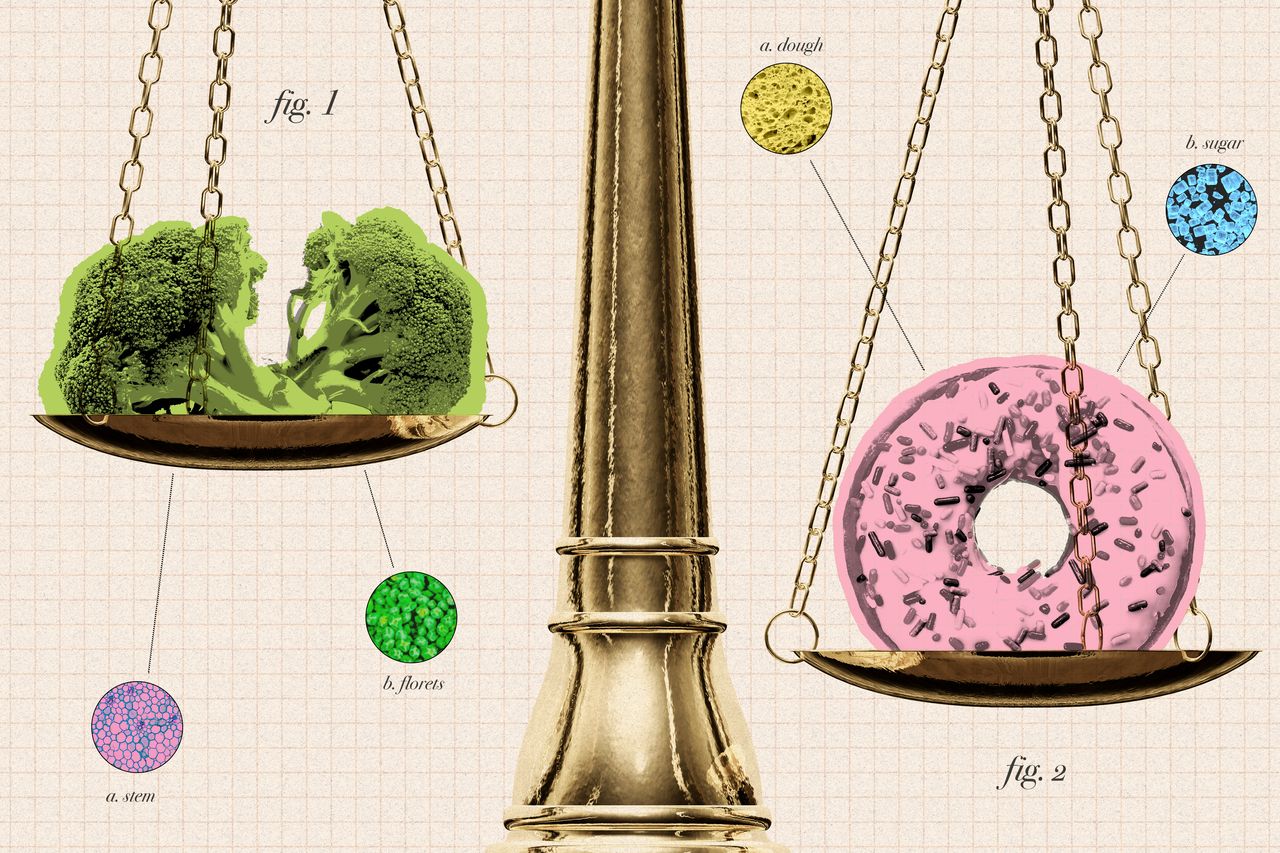The Science-Backed Strategies That Will Actually Help You Eat Better
Many of the strategies that you think will work don’t. Here are the surprising things that do.
We know what we should eat. Trouble is, most of us have a hard time sticking to it.
Researchers are racing to understand what pushes people to make healthier food choices. They are finding that broad resolutions to “eat better” are less effective than setting a couple of smaller rules, that eating with other people is helpful and that grocery shopping online can be better than going to the store.
The issue is urgent: The number of Americans who are overweight or have obesity is rising. Nearly three-quarters of US adults ages 20 and older are overweight or obese, according to 2017-2018 figures from the Centers for Disease Control and Prevention, and some surveys have found that obesity rates rose further during the pandemic.
Doctors and scientists broadly agree that a healthful diet is rich in vegetables, fruits, whole grains and lean meat and poultry—and is composed of fewer foods linked to poor health, including sugar-sweetened foods and drinks, refined grains and large amounts of red meat. Yet most of Americans don’t consume the recommended amount of vegetables, and three-quarters overeat refined grains, such as white bread, according to a government report.
“We’re living in a time where there’s food everywhere. You go to buy a hammer and there’s soda in the checkout line,” says Erica Kenney, assistant professor of public health nutrition at the Harvard T.H. Chan School of Public Health. “People berate themselves, but they are fighting against the environment.”
Whether you are trying to overhaul your diet, resist the peanut-butter cups in the checkout aisle or maintain the good habits you already have, research suggests some ways to make healthy eating easier.
Set one or two specific rules, and stick to them.
People are more likely to act on a plan if it consists of simple steps, psychology research has found. Having one broad goal—such as, “I’m going to eat better”—generally isn’t effective.
Pick one or two specific eating rules and stick to them—and think of yourself as someone who doesn’t do those things. For instance: I don’t consume sugary drinks. Or I don’t eat fried foods. Or I don’t eat dessert during the week.
Restricting yourself in multiple ways makes it harder to stick with good intentions, says Christina A. Roberto, associate professor of health policy at the University of Pennsylvania’s Perelman School of Medicine.
Conversely, setting a rule “just takes the decision out of it,” says Deborah F. Tate, professor at the Nutrition Research Institute at the University of North Carolina.
Make a grocery list, and shop online.
Making a shopping list of healthful foods can encourage you to avoid impulse buys when you are at the store, says UNC’s Dr. Tate.
Shopping for groceries online might be even more effective since unhealthy items aren’t right in front of you. Research has found that people tend to make better food choices farther in advance of eating, so the delay between making an online order and receiving it could be helpful, Dr. Roberto says.
People looking to lose weight who shop online buy fewer high-fat foods and fewer items overall compared with those who shop in person, according to a 2007 study in the International Journal of Behavioral Nutrition and Physical Activity that followed 28 participants over eight weeks.
One caveat: Be wary of online ads trying to persuade you to buy items you didn’t plan to purchase. That marketing can derail your good intentions.
Good sleeping begets good eating.
Not sleeping enough (generally less than six-and-a-half hours a night) is linked to weight gain, scientific studies have found. Sleep experts generally recommend that healthy adults get between seven and nine hours of sleep a night.
When we are awake longer, we have more time to eat. And there are biological changes that occur when we don’t sleep enough that can lead to overeating.
“Some research suggests there are potential changes to appetite-related hormones when we have short sleep,” says Alyssa Minnick, a postdoctoral fellow in the Division of Sleep Medicine at the University of Pennsylvania’s Perelman School of Medicine. When we are sleep-deprived we tend to crave more high-fat foods, too, she says.
Penn researchers found that study participants allowed to sleep just four hours a night for five nights ate on average an extra 550 calories daily. The paper was published in 2013 in the journal Sleep. More recent research has had similar findings.
Don’t eat alone.
When we eat with family and friends we tend to make more well-rounded meals with vegetables, proteins and other components, says Barbara J. Mayfield, a registered dietitian in Delphi, Ind. We also tend to eat more slowly, and often mindfully, when with others, she says, making us better able to notice when we are full.
Eating with others who are also committed to healthy eating can help us achieve our goals, says Rebecca Seguin-Fowler, associate director of the Institute for Advancing Health Through Agriculture at Texas A&M University. You are more apt to skip dessert when your dining companions are too, she says.
Studies have found that when one person in a household is trying to improve their diet and lose weight, the other members lose weight too, even if they aren’t trying to, says Amy Gorin, interim vice provost for health sciences at the University of Connecticut.
 Copyright 2020, Dow Jones & Company, Inc. All Rights Reserved Worldwide. LEARN MORE
Copyright 2020, Dow Jones & Company, Inc. All Rights Reserved Worldwide. LEARN MORE
This stylish family home combines a classic palette and finishes with a flexible floorplan
Just 55 minutes from Sydney, make this your creative getaway located in the majestic Hawkesbury region.
As Paris makes its final preparations for the Olympic games, its residents are busy with their own—packing their suitcases, confirming their reservations, and getting out of town.
Worried about the hordes of crowds and overall chaos the Olympics could bring, Parisians are fleeing the city in droves and inundating resort cities around the country. Hotels and holiday rentals in some of France’s most popular vacation destinations—from the French Riviera in the south to the beaches of Normandy in the north—say they are expecting massive crowds this year in advance of the Olympics. The games will run from July 26-Aug. 1.
“It’s already a major holiday season for us, and beyond that, we have the Olympics,” says Stéphane Personeni, general manager of the Lily of the Valley hotel in Saint Tropez. “People began booking early this year.”
Personeni’s hotel typically has no issues filling its rooms each summer—by May of each year, the luxury hotel typically finds itself completely booked out for the months of July and August. But this year, the 53-room hotel began filling up for summer reservations in February.
“We told our regular guests that everything—hotels, apartments, villas—are going to be hard to find this summer,” Personeni says. His neighbours around Saint Tropez say they’re similarly booked up.
As of March, the online marketplace Gens de Confiance (“Trusted People”), saw a 50% increase in reservations from Parisians seeking vacation rentals outside the capital during the Olympics.
Already, August is a popular vacation time for the French. With a minimum of five weeks of vacation mandated by law, many decide to take the entire month off, renting out villas in beachside destinations for longer periods.
But beyond the typical August travel, the Olympics are having a real impact, says Bertille Marchal, a spokesperson for Gens de Confiance.
“We’ve seen nearly three times more reservations for the dates of the Olympics than the following two weeks,” Marchal says. “The increase is definitely linked to the Olympic Games.”

Getty Images
According to the site, the most sought-out vacation destinations are Morbihan and Loire-Atlantique, a seaside region in the northwest; le Var, a coastal area within the southeast of France along the Côte d’Azur; and the island of Corsica in the Mediterranean.
Meanwhile, the Olympics haven’t necessarily been a boon to foreign tourism in the country. Many tourists who might have otherwise come to France are avoiding it this year in favour of other European capitals. In Paris, demand for stays at high-end hotels has collapsed, with bookings down 50% in July compared to last year, according to UMIH Prestige, which represents hotels charging at least €800 ($865) a night for rooms.
Earlier this year, high-end restaurants and concierges said the Olympics might even be an opportunity to score a hard-get-seat at the city’s fine dining.
In the Occitanie region in southwest France, the overall number of reservations this summer hasn’t changed much from last year, says Vincent Gare, president of the regional tourism committee there.
“But looking further at the numbers, we do see an increase in the clientele coming from the Paris region,” Gare told Le Figaro, noting that the increase in reservations has fallen directly on the dates of the Olympic games.
Michel Barré, a retiree living in Paris’s Le Marais neighbourhood, is one of those opting for the beach rather than the opening ceremony. In January, he booked a stay in Normandy for two weeks.
“Even though it’s a major European capital, Paris is still a small city—it’s a massive effort to host all of these events,” Barré says. “The Olympics are going to be a mess.”
More than anything, he just wants some calm after an event-filled summer in Paris, which just before the Olympics experienced the drama of a snap election called by Macron.
“It’s been a hectic summer here,” he says.

AFP via Getty Images
Parisians—Barré included—feel that the city, by over-catering to its tourists, is driving out many residents.
Parts of the Seine—usually one of the most popular summertime hangout spots —have been closed off for weeks as the city installs bleachers and Olympics signage. In certain neighbourhoods, residents will need to scan a QR code with police to access their own apartments. And from the Olympics to Sept. 8, Paris is nearly doubling the price of transit tickets from €2.15 to €4 per ride.
The city’s clear willingness to capitalise on its tourists has motivated some residents to do the same. In March, the number of active Airbnb listings in Paris reached an all-time high as hosts rushed to list their apartments. Listings grew 40% from the same time last year, according to the company.
With their regular clients taking off, Parisian restaurants and merchants are complaining that business is down.
“Are there any Parisians left in Paris?” Alaine Fontaine, president of the restaurant industry association, told the radio station Franceinfo on Sunday. “For the last three weeks, there haven’t been any here.”
Still, for all the talk of those leaving, there are plenty who have decided to stick around.
Jay Swanson, an American expat and YouTuber, can’t imagine leaving during the Olympics—he secured his tickets to see ping pong and volleyball last year. He’s also less concerned about the crowds and road closures than others, having just put together a series of videos explaining how to navigate Paris during the games.
“It’s been 100 years since the Games came to Paris; when else will we get a chance to host the world like this?” Swanson says. “So many Parisians are leaving and tourism is down, so not only will it be quiet but the only people left will be here for a party.”
This stylish family home combines a classic palette and finishes with a flexible floorplan
Just 55 minutes from Sydney, make this your creative getaway located in the majestic Hawkesbury region.






















